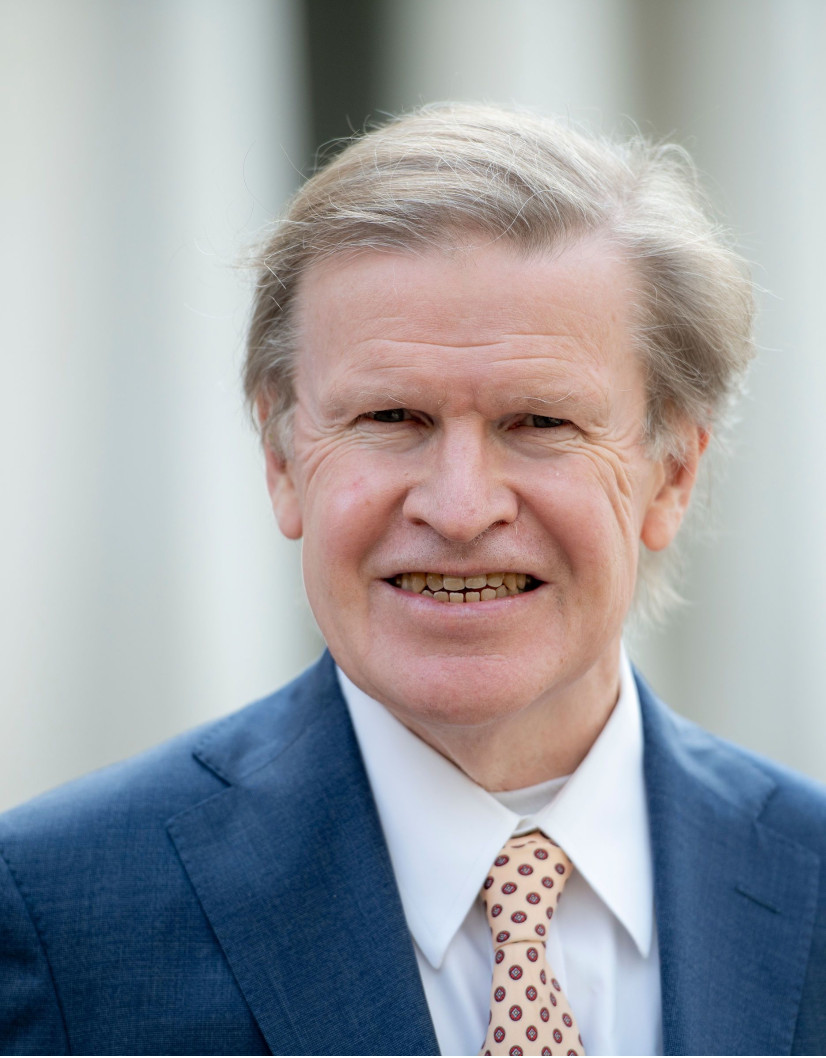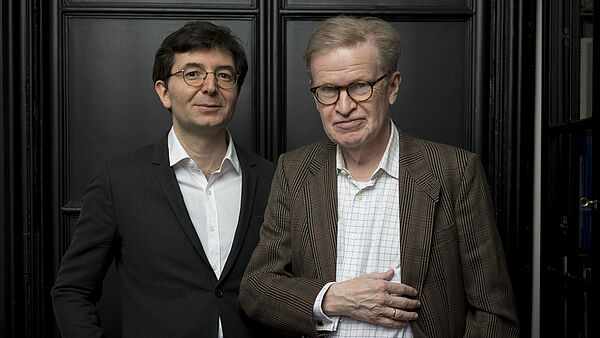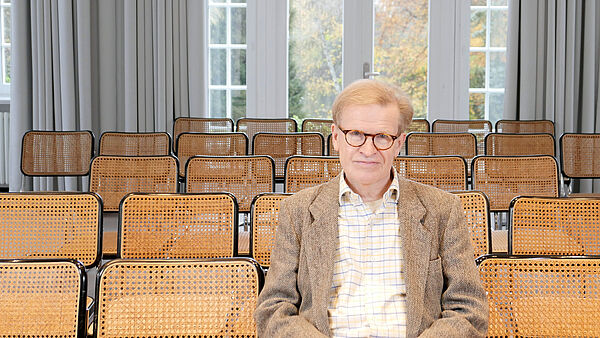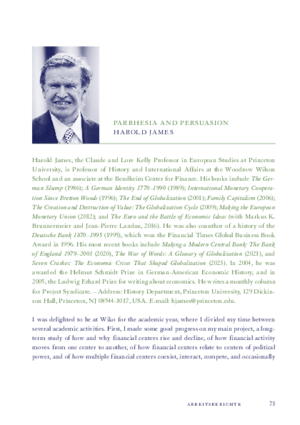
Harold James, PhD, Dr. h.c.
Professor of History and International Affairs
Princeton University
Born in 1956 in Bedford, United Kingdom
Studied History at Cambridge University
Arbeitsvorhaben
The History of Modern Finance
Finance plays a key role in the story of the history of capitalism because financial institutions involve a degree of organization that serves to camouflage or obscure the market process. The extent of financialization can be measured; but often the growth in the scale of financial institutions means a camouflaging or even suppression of basic market signals. Banks, which are at the center of finance capitalism, have consequently puzzled many observers. They are conceptually a black box, in which the outsider – the depositor – does not really know much about how his money is being used; consequently, banks are subject to panics and runs as some depositors change their opinion and come to believe that their funds may not be safe and as other depositors realize that the fact of a run means that not all liabilities can be paid and that it is advantageous to be first in line to make a withdrawal. Modern banks have increased their complexity and hence their intransparency. In the recent financial crisis, observers were astonished to find that in a panic, price signals no longer operated to clear markets and that it was impossible to determine the worth of complex derivative products. This study will emphasize the way capitalism – especially financial capitalism – depends on often intransparent clusters and networks. These develop in particular locations – capitalist hubs – but depend on technologies that extend their influence widely, even globally. The study showcases particular examples of key figures in social and financial networks, emphasizing linkages between finance and other activities, including artistic patronage and politics. How do the practitioners of an activity that depends on undisclosed and non-public information convince others of their competence and probity: through political activity, artistic or religious practice, or even skill at nonfinancial strategic games, from chess to bridge to Tai Chi?Recommended Reading
James, Harold. The German Slump: Politics and Economics 1924–1936. Oxford: Clarendon Press, 1986.
—. The End of Globalization: Lessons from the Great Depression. Cambridge, MA: Harvard University Press, 2001.
—. Seven Crashes: The Economic Crises That Shaped Globalization. New Haven, CT: Yale University Press, 2023.
Kolloquium, 19.03.2024
Wie können wir die Verflechtung von Globalisierung und Finanzialisierung verstehen?
Mein Hauptprojekt in diesem Jahr ist es, die Entstehung und den Kontext des modernen Finanzwesens zu untersuchen und insbesondere darzustellen, wie es sich in den letzten 500 Jahren globalisiert hat. Das Finanzkapital spielt in einigen Phasen der kapitalistischen Erzählung eine zunehmend wichtige Rolle. Fast jede Analyse des Kapitalismus seit Smith und Marx enthält den Begriff der Phasen. In seiner ikonischen (und inzwischen offenkundig veralteten) Formulierung identifiziert Fernand Braudel vier Zyklen mit einem geografisch-hegemonialen Kern (Genua, Amsterdam, London, New York), wobei in jedem Zyklus ein fortschreitender Umwandlungsprozess von realen Vermögenswerten in Geldvermögen stattfindet. In den letzten zwanzig Jahren haben viele versucht, eine neue Phase auszumachen, in der sich das Finanzzentrum der Welt ostwärts nach Asien und insbesondere nach China verlagert, wobei Shanghai in die Fußstapfen des verfallenden New York tritt. Auffallend ist, dass die letzten beiden Fälle von Braudel, nicht aber die ersten beiden, mit der Geschichte vom „Aufstieg und Fall der großen Mächte“ übereinstimmen, wie sie von Paul Kennedy erzählt wird, in der Spanien die britische und dann die amerikanische Hegemonie vorwegnimmt. Die italienischen Stadtstaaten und die niederländische Republik mussten ein komplexes, weltumspannendes und stark regelbasiertes Finanzsystem betreiben, ohne eine globale Sicherheitsordnung durchsetzen zu können.
Anschließend zeige ich an einem konkreten Fall, wie und unter welchen Umständen einer der Übergänge stattfand: die Ablösung Londons durch New York als Finanzzentrum im 20. Jahrhundert. Ich versuche, anhand dieses Falles zu zeigen, dass die Bedingungen des Übergangs nicht nur durch wirtschaftliche Stärke, sondern auch durch rechtliche und sicherheitspolitische/militärische Macht bestimmt werden. Ich beginne mit der Ausarbeitung eines Paradoxons oder Dilemmas, das der ursprünglich belgische Wirtschaftswissenschaftler Robert Triffin für die Position des Finanzhegemons ausgemacht hat. In den späten 1950er Jahren, als sich der Übergang zu einem auf dem Dollar basierenden System konsolidierte, prophezeite Triffin, dass dieses System eine Anfälligkeit mit sich bringt: Entweder schafft der Hegemon zu viele Verbindlichkeiten und riskiert das Äquivalent eines Bankansturms, wenn andere Länder seine Vermögenswerte abstoßen; oder er hat nicht genug Verbindlichkeiten, in diesem Fall kommt es zu einer weltweiten Deflationsspirale, wie sie in der Zwischenkriegszeit auftrat, in der andere Länder dann gezwungen sind, ihre eigenen Vermögenswerte und Verbindlichkeiten zu erzeugen. Ich verfolge insbesondere die Entwicklung eines prophetischen und eindrücklichen Vorläufers der Triffin-Analyse in den späten 1920er Jahren. Ich hoffe, dass sich dabei ein Aspekt herauskristallisieren wird: dass die Entscheidungen über die hegemoniale Macht und die Ansichten über die Gutartigkeit des Hegemons oft ganz weit weg von den Zentren getroffen werden.
Publikationen aus der Fellowbibliothek
James, Harold (Freiburg, 2024)
Der Krieg der Worte : 16 Schlüsselbegriffe im Kampf um die Weltordnung War of the words
James, Harold (New Haven, 2023)
Seven crashes : the economic crises that shaped globalization Seven crashes
James, Harold ([Deutschland], 2022)
Schockmomente : eine Weltgeschichte von Inflation und Globalisierung 1850 bis heute
James, Harold (Cambridge, 2020)
Seven transformative crises from European revolution to corona : globalization and state capacity
James, Harold (München, 2014)
Swiss Re und die Welt der Risikomärkte : eine Geschichte
James, Harold (Oxford, 2011)
International order after the financial crisis
James, Harold (München, 2011)
Krupp : deutsche Legende und globales Unternehmen Krupp
James, Harold (Cambridge, Mass. [u.a.], 2006)
Family capitalism : Wendels, Haniels, Falcks, and the continental European model
James, Harold (Cambridge [u.a.], 2004)
The Nazi dictatorship and the Deutsche Bank
James, Harold (Aldershot, Hants, UK, 2002)
Enterprise in the period of fascism in Europe Studies in banking history
Lectures & Keynotes 29.04.2024


